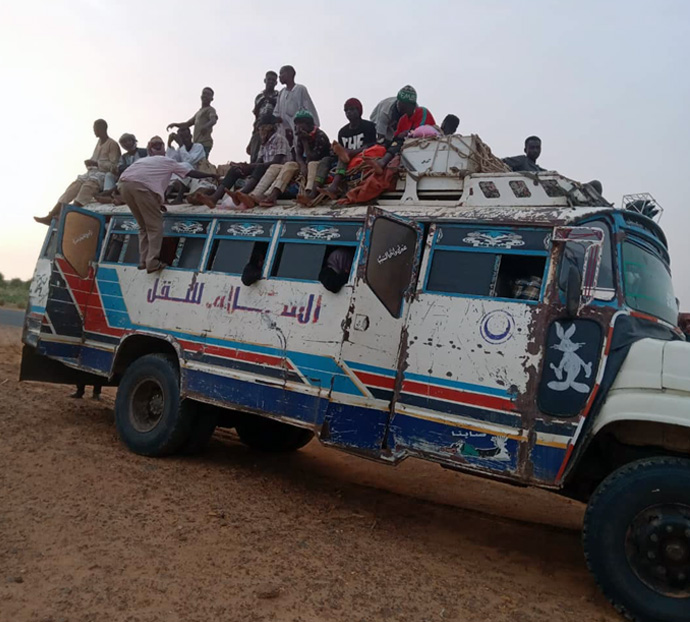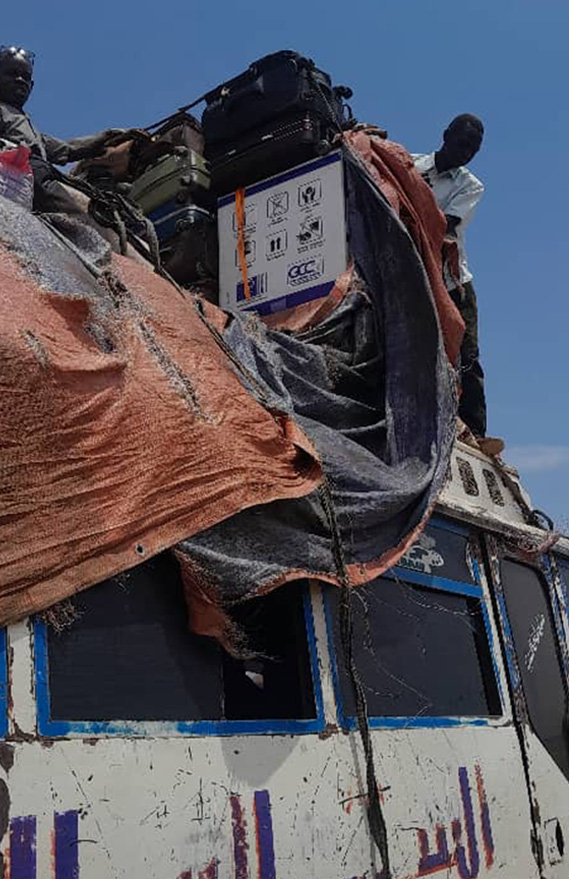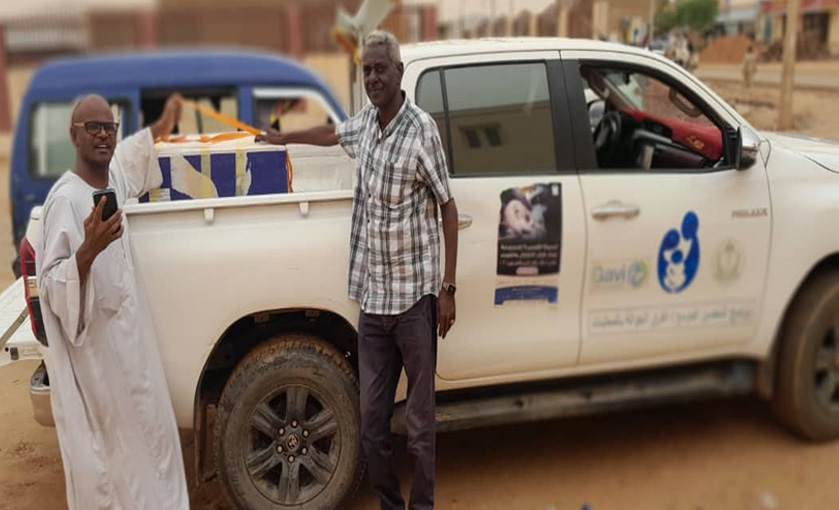 Mohamed Al Hassan Hasab Allah boards a public bus carrying AFP samples for the 5-day drive from Kosti in White Nile to Dongola in Northern State
Mohamed Al Hassan Hasab Allah boards a public bus carrying AFP samples for the 5-day drive from Kosti in White Nile to Dongola in Northern State
24 September, Port Sudan, Sudan – Surveillance is used to detect traces of poliovirus among children and in the environment. It is an essential step in ensuring that timely responses halt the further spread of polio.
Since the start of the conflict in Sudan in April 2023, the Federal Ministry of Health and the World Health Organization (WHO) have been forced to find new ways to continue the search for poliovirus in children presenting with acute flaccid paralysis (AFP) and in wastewater samples.
Once collected, samples must be laboratory tested. Before the conflict, AFP and sewage water samples were tested at the National Polio Laboratory, embedded in Khartoum’s National Public Health Lab (NPHL), with results available within a maximum of 3 days.
When the polio lab became inaccessible due to the expanding conflict, polio teams found ways to safely store samples in designated states and transport them to the VACSERA Regional Reference Laboratory in Cairo via the Argeen border crossing in Sudan’s Northern State.
As the conflict spread, it forced further changes on the strategies used by polio teams. At the beginning of the conflict, when Khartoum was the epicentre of fighting, samples were stored in Al Gezira. When the conflict spread to Al Gezira in December 2023, samples began to be stored in Sennar State. By June 2024, however, Sennar could no longer be used as a storage location and a new route to Northern State had to be found.
Insecurity in Sudan had already resulted in frequent power outages and exorbitant costs of fuel to maintain a back-up generator necessary for reverse cold chain. The polio team continued to look for solutions, which included using public transport to move samples to their next destination while maintaining the required temperature.
Keeping cool
 Sample transportation from Kosti, White Nile to Dongola, Northern State using public transportTo transport stool samples from Kosti city in White Nile State to Dongola, the Northern State capital, from where they could then be forwarded to the VACSERA Lab in Cairo, WHO Field Immunization Officer in White Nile State Dr Abdellatif Mahgoub Abdelwahab negotiated with a private transportation company and convinced them to carry the samples despite some initial hesitation.
Sample transportation from Kosti, White Nile to Dongola, Northern State using public transportTo transport stool samples from Kosti city in White Nile State to Dongola, the Northern State capital, from where they could then be forwarded to the VACSERA Lab in Cairo, WHO Field Immunization Officer in White Nile State Dr Abdellatif Mahgoub Abdelwahab negotiated with a private transportation company and convinced them to carry the samples despite some initial hesitation.
To ensure the safe transportation of the samples, Dr Abdellatif assigned a colleague, Mohamed Al Hassan Hasab Allah, to carry them on the 1860 km drive from Kosti to Dongola. Mohamed made the 5-day trip on a bumpy road in extremely hot weather – with temperatures soaring to more than 40 oC – in a vehicle without air conditioning. “The only thing that remained cool on that bus were the samples in the icebox,” said Mohamed. “Often there was not enough to drink. Despite the discomforts, I am happy to play a part in safely transporting the samples. I do it for my children, and for the children of Sudan.”
Cross-cutting benefits of the polio sample transportation system
As part of its health emergency response to the conflict in Sudan, WHO supports the national surveillance system of the Federal Expanded Programme on Immunization (EPI) to dispatch measles as well as AFP samples for testing.
“Since April 2023, when the conflict started, WHO, in coordination with the Federal EPI programme, has dispatched 1037 stool samples from AFP patients and their close contacts, and environmental samples from 18 states in 9 batches through the Argeen crossing point to Egypt for testing. Alongside these, measles samples were also transported,” says WHO Immunization Team Lead Dr Mohammed Taufiq Mashal.
 Handover of samples to the focal point in Al Dabbah, Northern State. The focal point then transports the samples to Dongola
Handover of samples to the focal point in Al Dabbah, Northern State. The focal point then transports the samples to Dongola
“The laboratory results confirmed the presence of poliovirus in environmental samples from the Red Sea and White Nile States in 2023 and 2024 respectively. Following confirmation, Sudan’s Ministry of Health conducted a series of oral polio vaccination campaigns in collaboration with WHO and UNICEF.”
WHO covered the additional costs for sample transportation, including for maintaining optimum temperatures, during this process.
Thanks to the creativity and dedication of health workers, a ninth batch of samples arrived in Dongola despite all the hurdles. The samples are currently stored in the state’s reverse cold chain, ready for shipment to VASCERA.
The WHO Country Office in Sudan is working with the Directorate General of Public Health Laboratories and EPI to re-establish the National Polio Lab within the Port Sudan Public Health Laboratory. This will be a sustainable solution to the need for testing of samples.
WHO is also strengthening the national surveillance system through capacity building, support with case investigation, provision of sample collection kits, sample transportation and the monitoring of reverse cold chain using log-tag.


